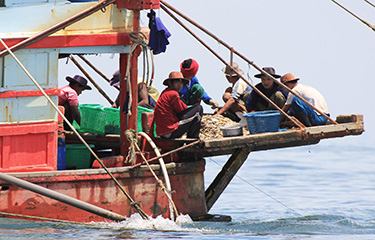Asian countries feature on US Labor Department report for child, forced labor

Taiwan and Thailand both feature prominently on the new edition of a U.S. Department of Labor report on child and forced labor, which identifies abuses in both countries’ seafood sectors.
Released 28 September, 2022, the “List of Goods Produced by Child Labor or Forced Labor,” dinged Taiwan and Thailand for alleged use of forced labor in their fishing sectors, while Thailand also received mention for alleged use of child and forced labor in its shrimp-processing industry.
The presence of forced labor in China’s fishery sector was also flagged in the report, largely due to alleged labor abuses in the country’s huge distant-water fishing fleet.
Bangladesh was also cited for alleged use of child labor in its shrimp sector, and use of child and forced labor in its dried fish industry.
Myanmar was cited for alleged use of forced labor in its shrimp industry, and Cambodia received mention in the report for alleged use of forced labor in its fish and shrimp industries. The alleged presence of child labor in Vietnam’s fish sector was also flagged.
The new version of the report has a particular focus on risks in the renewable energy equipment industry, including the Chinese polysilicon sector.
Taiwan and Thailand – both nominally American allies – were also named in the U.S. State Department’s Trafficking in Persons Report (TIP) report, released in July 2022. But environmental and labor campaigners said geopolitical considerations were blunting Washington’s ability to curb labor abuses in global fisheries after this year’s TPP kept Taiwan at Tier One status while upgrading Thailand and Ireland to Tier Two status, despite claims of labor abuse in the fishing industries of all three nations.
Taiwan, an open democracy where – unlike in much of Asia – NGOs are allowed operate freely, has been a focus of particular attention from Greenpeace, which has continued a multi-year campaign targeting Bumble Bee Foods and its Taiwan-based owner, Fong Chun Formosa (FCF) Fishery Company, for alleged labor transgressions and illegal fishing by some of their key tuna suppliers in Taiwan. The country has second-largest distant-water fishing fleet in the world, with an estimated 1,100 vessels employing an estimated 35,000 migrant workers.
Taiwan’s inclusion in the latest report is “regrettable,” but the country is striving to expand labor protections and be removed from the list as soon as possible, Taiwan's Fisheries Agency said in a statement, according to the Taipei Times.
Photo courtesy of Charlie Waradee/Shutterstock






Share